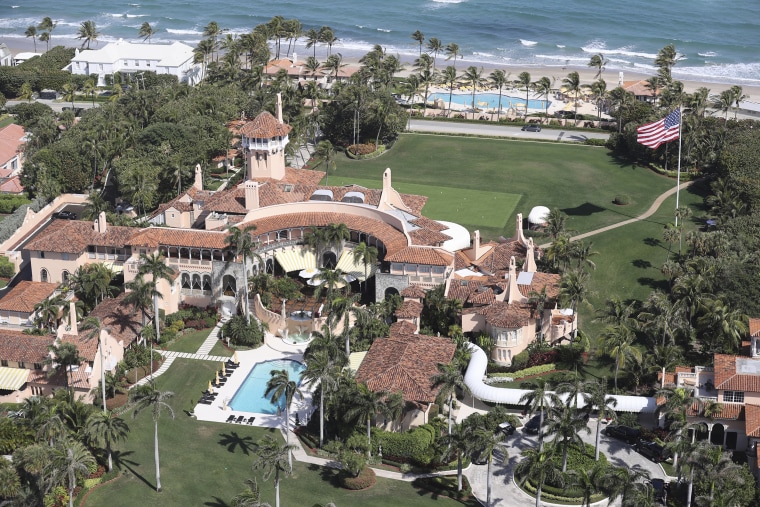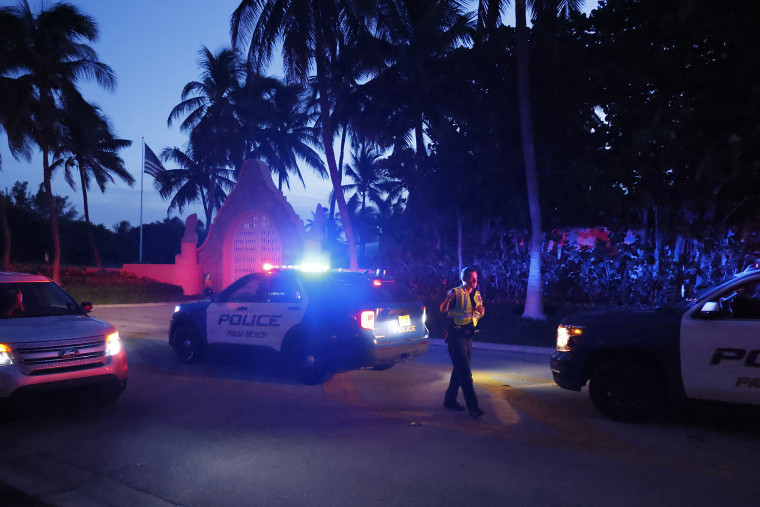Former President Donald Trump's allies say all classified White House documents he brought into the Mar-Arago mansion have been declassified, but some legal and presidential records experts are skeptical of the claims — and say Trump could be at risk of crime regardless.
The Department of Justice has a longhistory ofprosecutions involving mishandling of classified information, but such cases are the only cases where information can be declassified. has never been brought against the former president, a high-ranking government official. at will.
"As it stands, his justification would be, 'I have declassified those documents, so I don't have any classified documents now.'" said Charles Stimson, his senior fellow at the conservative Heritage Foundation.
Others see it differently — the FBI executed a search warrant at Trump's Florida resort on Monday, linked to classified information Trump allegedly took out. seems to be Trump's attorney, Christina Bob, said Tuesday that the warrant left by her agent was investigating possible violations oflaws relating to the handling of classified materials and the Presidential Records Act,. said there is.
The Presidential Records Act of 1978requires the president to turn over documents to the National Archives at the end of his administration, but lacks an enforceable mechanism. , there are several federal laws concerning Han. processing sensitive documents. Trump said hesigned into lawone such law in 2018, giving him penalties for the "unauthorized removal and retention of classified documents or materials." sentenced to a year in prison.
But those in Trump's orbit say no president is personally bound by deletion and retention rules governing classified documents, according to former Trump acting director Rick Grenell. they said. The Director of National Intelligence, who handled highly classified information.
"There is no approval process for the President of the United States to declassify classified information. There is this bogus idea that he must provide notice for declassification, which is ridiculous." Who is he supposed to notify? I think it's a dead end to think that the president should seek bureaucratic approval," Grenell told NBC News, personally speaking for the president. I emphasized that I am not.
Richard Immerman, a historian and former Assistant Secretary of National Intelligence under President Barack Obama, disagreed, saying that while the president has the power to declassify the documents, There is a formal process to do so and no indication Trump has used it.
"He can't just wave his cane and say it's been declassified," Immermann said. "We need a formal process. That's the only way the system works," he added.
"I have seen thousands of declassified documents. They are all marked 'declassified' with the date they were declassified," Immermann said.
That does not appear to be the case with some of the documents returned to the National Archives by Mar-a-Lago earlier this year. David S., an archivist appointed by President Obama. In a letter to the House Oversight and Reform Committee in February, Ferriero wrote that his agency was "classified as a national secret." We have identified the marked items." Security information is from Mar-a-Lago".
His Kash Patel, who was the Pentagon's chief of staff in the Trump administration, told Breitbart News in May. The documents recovered from Marlago were declassified by Trump, but their markings were not updated. “Trump declassified the entire set of materials in anticipation of leaving government, believing the American people should have the right to read them for themselves.
Information that Trump felt he spoke about everything from debacles to major national security issues of very high public importance, and whatever the president felt the American people had a right to know. Patel then added that he was with Trump when the then president said, "We are declassifying this information."
Patel, who declined to comment on the documents earlier this week, told Breitbart:
An unauthorized source who has discussed the issue with Mr. Trump, but reveals the conversation, said the former president had no interest in a formal protocol.
"I told him that there is a process and if you don't follow it, it could be a problem, but he thinks this is ridiculous and didn't care." a source said. president. Since he is in charge of the country, he is in charge of national security. So he decides.
"It doesn't work," said Bradley Moss, a lawyer who specializes in national security matters.
"Trump could say this is declassified until he turns blue. But no one is allowed to touch those records until the markings are dealt with." No," said Moss, a frequent Trump critic on Twitter.

He said that Trump and White House officials, given their own experience with the issue, He said he should have recognized that more work was needed to declassify the documents. In October 2020, Trump tweeted. A document about the Russian hoax, the biggest political crime in American history. Similarly, the Hillary Clinton email scandal. No edits.
When the press attempted to obtain the supposedly declassified documents, they were told they were still classified. Trump's Chief of Staff Mark Meadows said in an affidavit in the case: Statements on Twitter are not self-enforcing declassification orders and do not require the declassification or disclosure of any particular document.
In the current controversy, the apparent lack of written evidence that Trump declassified the documents before he resigned could pose a problem for the former president. said Steven Vladek, a professor at the University of Texas Law School.
"President Trump had the power to declassify necessary documents during his presidency, but no longer. Currently,it can be argued that he declassified the document while he was still in office, without evidence to support it," Vladek said.
Stimson of the Heritage Foundation has a different view. Trump was once the “ultimate declassification authority.”
"If the president decides to declassify the document and doesn't tell anyone - but he decides to declassify something - then the document is declassified. Stimson
added: The president decides, but he decides whether the document will be declassified if he doesn't communicate it outside his head.
Mr Vladek said Mr Trump would face legal problems because "some of the criminal law under discussion applies whether or not the underlying information is classified". said it could be done.
“The Presidential Records Act and other similar statutes are relevant to at least some of the public documents that President Trump has made while in office, whether or not those documents contain classified national security information. It limits his ability to do what he wants," Vladek said.
Moss said his one of the laws prosecutors could theoretically oppose Trump was 18U. S. Code § 793 — Said "collection, transmission, or loss of defensive information."
The law provides that "a person in the lawful possession, access, custody, or entrusted with any document, document, codebook, or memo relating to national defense" may, with gross negligence, removed from proper storage, delivered to anyone against trust, lost, stolen, removed, or destroyed.” and “keep the same knowingly and entitled to receive it on demand.” Penalties also apply to anyone who fails to surrender to an officer or employee in United States states.
In this case, the National Archives said it had been negotiating with Trump's team for the return of the documents since last year, and Moss said Trump's lawyers said they Department of Justice Records still missing in early June. On Thursday, a source familiar with the matter confirmed to NBC Newsthat it had also received a federal grand jury subpoena demanding the return of classified documents the government believed Trump held. Did.
However, it is still unclear what exactly investigators were looking for in Mar-a-Lago, or whether it was ever found. "I don't know what we don't know," said Moss.

Immerman said that given the information already revealed by the National Archives, all classified information sent to Mar I said it was most likely mishandled. in the middle. "When you move, you don't just put it in a briefcase, you put it in a double-locked pouch," he said. "When I worked for the National Intelligence Service, I couldn't carry the papers myself. Someone had to accompany me," added Immermann.
Former federal corruption prosecutor Noah Bookbinder, president of the left-wing government watchdog group Citizens for Responsibility and Ethics in Washington, said: Deletion may also result in legal exposure.
Trump has denounced the raids as part of an ongoing Democratic "witch hunt" against him. "After working with relevant government agencies, this unannounced raid on my home was neither necessary nor appropriate," he said in a statement Monday.
Stephen Miller, a former senior White House adviser who still speaks regularly with the former president, explained how Trump handled and declassified the documents. He said he could not talk about the details. Breaking the law represents a "completely upside-down nonsensical understanding of our constitution."
"The president can choose to use the declassification process or not," Miller said.
The organization filed a lawsuit against the Trump administration for flaunting its record-keeping policies, Bookbinder said Trump and his aides also denied that the records they took belonged to them. He said he should have been fully aware that there was no.
"These were all presidential records and should have been turned over to the National Archives," Bookbinder said.
"A White House attorney informed Donald Trump and others of the requirements under the Presidential Records Act. It would be difficult to say I didn't," Bookbinder said.
Immerman said he was plagued by the potential loss of records, especially given reports that Trump destroyed government documents during his tenure.
"I don't know what was destroyed," said Immermann.
“As a historian, I am deeply disturbed and disturbed. ."


